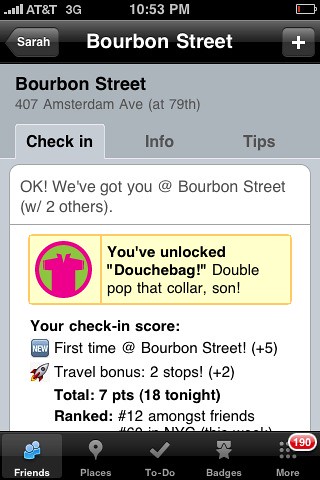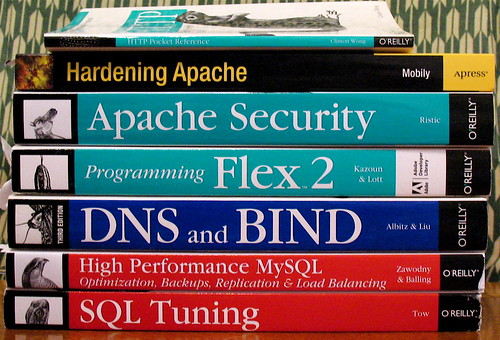Location is a Key Context, But Most People Don't Know This
Like a lot of people, I get most of the information I use, both personally and professionally, from the web; from RSS feeds, from keyword search alerts and from Twitter. The genesis of my recent Theory of Stuff slowly accumulated out of this mishmash of feeds, alerts and status updates.
Firstly I read about EchoEcho, a new location based service which promises all manner of good stuff by showing you where your friends are regardless of which location based service they currently use. Let's leave aside for one moment that the service independence of this app seems to be based around the concept of getting all your friends to use EchoEcho and then consistently getting them to report their location. Let's look at something far more fundamental than that, the strong sense of location deja vu harking back over two years ago. Haven't we been here before?
Haven't we been here before?
Hindsight seems to have proven that concepts such as "who's nearby" and "show me where my friends are" aren't, on their own, enough to build a business around. The brief flare of enthusiasm over services which tried this approach such as PlayTxt and DodgeBall were soon extinguished as users, fickle as they are, got bored and moved onto the next big thing.
Then there were two articles looking at "checking in", both looking at FourSquare and Gowalla but each one coming at it from wildly differing ends of the experience. On the one hand, there was Business Week quoting the eye watering "I don't feel complete unless I check in" from FourSquare, Gowalla and Yelp addict Diane Bisgeier. Though the article focuses on this as a San Francisco and the Bay Area phenomenon, this has crossed the Atlantic with vigorous checking in going on in the UK and in mainland Europe. I may even have contributed to this, from time to time.
A totally contrasting view was shown by Andrew Hyde who was fed up of "the needless ego boost" of saying where he was and "committed location based suicide" by deleting his accounts from FourSquare and Gowalla. We'll leave to one side the irony that this was done very publicly and with an accompanying blog post.
All of the above moved Thierry Gregorius to lament that "if 'normal' people don't see the point of location-based services, how can the geo-industry claim being mainstream?". A valid point but one which confuses the very visible front end view of location, as seen in LBMS and the less visible back end view of location. Ed Parsons summed this up succinctly by comparing back end location with the DNS system, which "normal people don't see the value of but use every day".
It was these three themes, "who's nearby" as a raison d'etre alone, maintaining an audience by check-ins alone and selling location based services to a wide audience that made me sit down and write up my Theory of Stuff. The full text of this is in a previous post, but the short version of the theory states that in order for a business to succeed you need three things, some Stuff, be it data, inventory or something else, some People, your audience and some Secret Sauce which allows you to connect the audience to the stuff in a bidirectional manner. So how do these three themes fare against the theory of stuff? Surprisingly and thankfully, they all seem to validate it.
The concepts of "who's nearby" and "where are my friends" on their own, fail the theory of stuff. You have People, and in some cases a very large and quickly growing audience. You have some Secret Sauce which connects those People via their locations. But because there's no Stuff to start with and the secret sauce isn't bidirectional, no Stuff is created. The effect of this is that monetization opportunities are non existent or severely limited and the service isn't sustainable. Both PlayText and DodgeBall are no more and the omens aren't looking good for EchoEcho as a result.Then there's FourSquare and Gowalla, both of whom seem to have been inspired by Google. Cast your mind back to when Google announced the concept of Street View which was met with sneers and derision from some. Before Street View even went live it was written off as a loss leader, a waste of time and money and it would be Google's white elephant.
Others of us in the location industry took one look at a Street View car and noted that the cameras weren't just pointing parallel to the road surface to take photos of surrounding buildings. They were also pointing at the road and up at the road signage which, when combined with the fact that the (GPS, cell tower and wifi triangulation equipped) StreetView cars actually had to drive down the streets in question, would provide Google with their own mapping data that was also capable of powering routing and direction algorithms. A short while later and Google completes enough of North America to remove the need for TeleAtlas mapping data and makes massive savings on data licensing into the bargain.
Street View passes the Theory of Stuff by providing new Stuff to be connected and monetized by their existing Secret Sauce and the People who make up their substantial audience.It would be easy to dismiss FourSquare and Gowalla as more up to date versions of the "where are my friends" service. While they seem to have created the current cultural phenomenon of checking in, which may well be their lasting legacy, both services have their own quirks (FourSquare's Mayors and Badges and Gowalla's items) and need to show they're capable of holding onto their existing audience and growing it, substantially. So this surely means that both FourSquare and Gowalla fail the Theory of Stuff? Not necessarily. Just as StreetView generated valuable Stuff for Google, so both FourSquare and Gowalla are also generating a detailed set of local business listings and points of interest, all of them neatly categorised and geotagged as a bonus. That's a lot of very valuable Stuff. This doesn't seem to have been something that's been noticed or commented on as much as it should be. If both these services can retain their audience and if they connect them with all the Stuff that is being captured and generated via Secret Sauce then they can most definitely pass the Theory of Stuff.
The idea that location is analogous to the Domain Name System is slightly more challenging to fit into the Theory of Stuff's model but it's still possible.In the previous two themes, location has been the dominant factor in the provision of a service (PlayText, Dodgeball, FourSquare and Gowalla) or location data has been generated in order to create Stuff (FourSquare and Gowalla). In the DNS theme, location is not the prime reason for a service to exist, it's a context, part of the Secret Sauce, that helps the service provide its users with relevant information. This was highlighted by Kevin Marks and JP Rangaswami in last year's excellent The Impact of Context on the Mobile User Experience discussion at the Heroes of the Mobile Screen conference in London. Of course, you still need Stuff and People in order for this to work; Secret Sauce on its own is not a recipe for success.
As nomadic devices have proliferated, the difference between The Web and The Mobile Web have vanished; it's just the web, regardless of how you experience it. A parallel can be drawn here with location. As location becomes more and more ubiquitous so the whole concept of a Location Based (Mobile) Service will also vanish, at least as a label. Location will just be a context. And there's nothing wrong with that; quite the reverse, as the location industry will have achieved their aim of ubiquity, of providing a service and information that everyone uses but which no one actually bothers to think about it being there.


